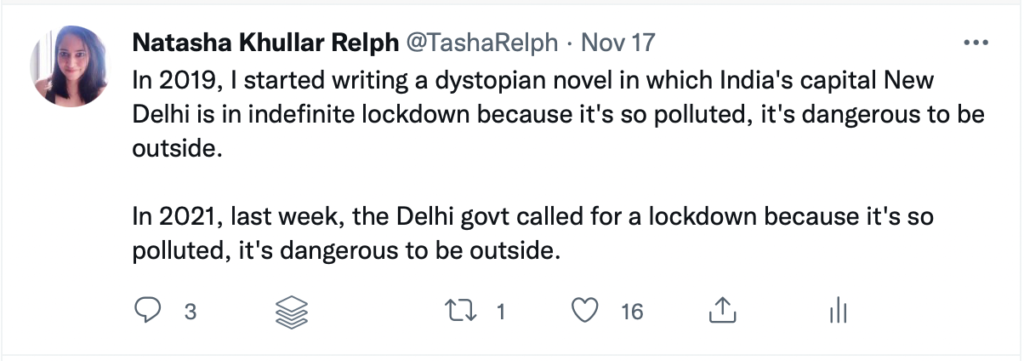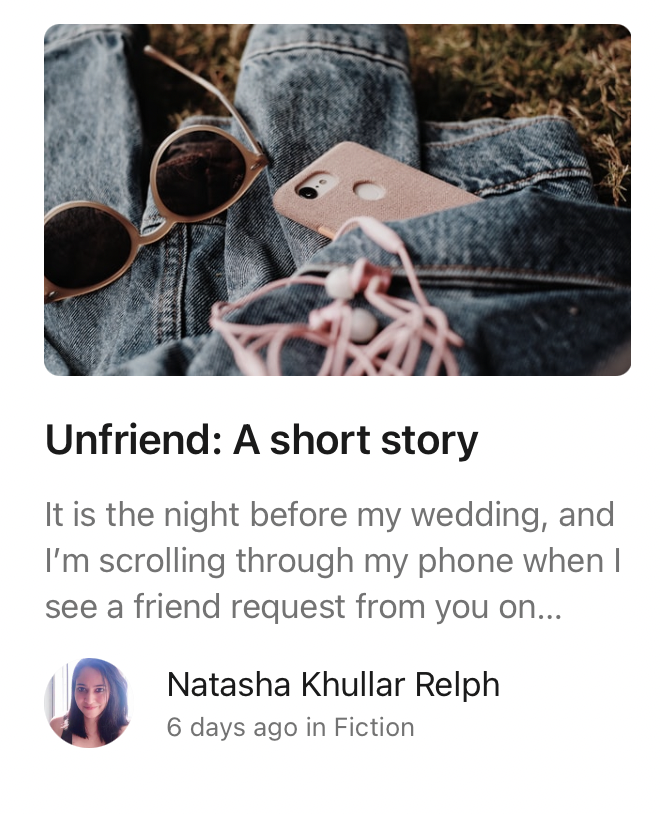Hi friends,
Sometimes, you have to kill a novel. Your darlings, as Stephen King would say, though I don’t think even he was that ruthless.
I’d planned to finish final revisions for my third novel in November. Then, this happened:

So, I had to do what all of us will have to do at some point in our careers if we write long enough: I had to let it go.
And I had to move on to the next one.
Which, I’m happy to say, I have.
You know what else I’m happy to say?
I published my first short story!
It’s been getting amazing feedback and reviews, and I’m super proud of it.
It’s been an interesting experience because I’ve been hearing from people who don’t necessarily know me or my work, but who saw it shared somewhere and checked it out, and absolutely loved it.
I’ve always thought of short stories as a fantastic path to audience building, but I’m seeing it happen now, and it’s fun.
I have a few more in progress and I spoke to my agent who said that while a debut short story collection is a harder sell than most things, if I get it him a short story collection alongside my next novel, he’ll try to sell both together.
So, at least we have a plan.
I do have some updates on my other books, though nothing in writing yet, so I’m going to have to wait to sign contracts before I can give you the details on that.
But, basically, here’s what I’ve been thinking about and where I’ve landed:

I think the way we think about publishing (as in indie versus traditional) is an outdated and old-fashioned approach, in two ways:
One, there is so much more choice and opportunity than what can be covered by traditional, big trade publishing, or straightforward indie.
There’s the hybrid model, there’s crowdfunding, there are niche small publishers that offer a much better experience than corporate publishing, there’s serialization, there’s Patreon, there’s Amazon’s Vella, there’s Wattpad. There are a whole variety of apps that are offering genre authors opportunities and book deals. And that’s before we even start talking about the audio and video side of things. I won’t even start with NFTs, because that’s a whole other email.
So, the question is no longer, should I publish traditionally or should I go indie?
The question is, of all these amazing options available to me, which ones can I mix and match in a way that provides satisfaction to me and gives my readers an amazing experience?
And that brings me to my second point. Readers. You know, the people we’re writing for? The people who buy the book, write the reviews, and allow us to do this thing that we love?
The reader is often an afterthought in the traditional vs. indie conversation. Because if you put the reader at the forefront of this decision, you would’t ask should I publish traditionally or go indie.
You’d ask, where is my ideal reader most likely to find my book? In what format?
That is, as I’ve talked about before, how I try to make my publishing decisions.
For my writing books, most of my readers are going to find them through this newsletter and The International Freelancer and they’re most likely to want to read them as ebooks. So that’s how I first made them available and why they became immediate Amazon bestsellers. (Print editions are now underway; they’ll be available next year.)
Had I tried to sell my writing books traditionally, it would have been a frustrating, depleting, and overwhelmingly torturous experience.
Equally, for my novels, I’ve long believed the readership is more likely to visit bookstores, read on recommendation, and trust newspaper reviews, and so traditional publishing has seemed like the better path.
In fact, yesterday evening I spoke with my friend, author and podcaster Joshua Pantalleresco, about how I’ve thought about my novel audience so far, and why those assumptions may have been wrong. You can listen to the interview here.
(And don’t forget to check out Josh’s book Alice Zero.)
So, the question then is not how does an author publish but how does a reader find a book?
And that’s a much more nuanced and interesting conversation because that can happen through traditional publishing, it can happen through indie, or it can happen through a mix of both.
As I said to Josh on the podcast, if I were to sign a traditional book deal, I’d definitely make sure to keep certain rights because I do plan to collaborate with other artists to bring out NFTs, something I doubt publishers would do for my books but would still want to keep the rights to.
So that’s where I’m at with the publishing side of things.
In terms of writing I am, as I do almost every December, going to spend the month lazily outlining my next novel and then in the twelve weeks from January to April, I’ll write it at a steady pace.
If you’d like to finish a book in 2022 and would like to join me for Write With Me 2022, make sure to open the next few emails.
We’ll be opening up registrations over the next few days and I think you’re going to love being a part of it in the coming year.
More tomorrow!
Cheers,
Natasha
